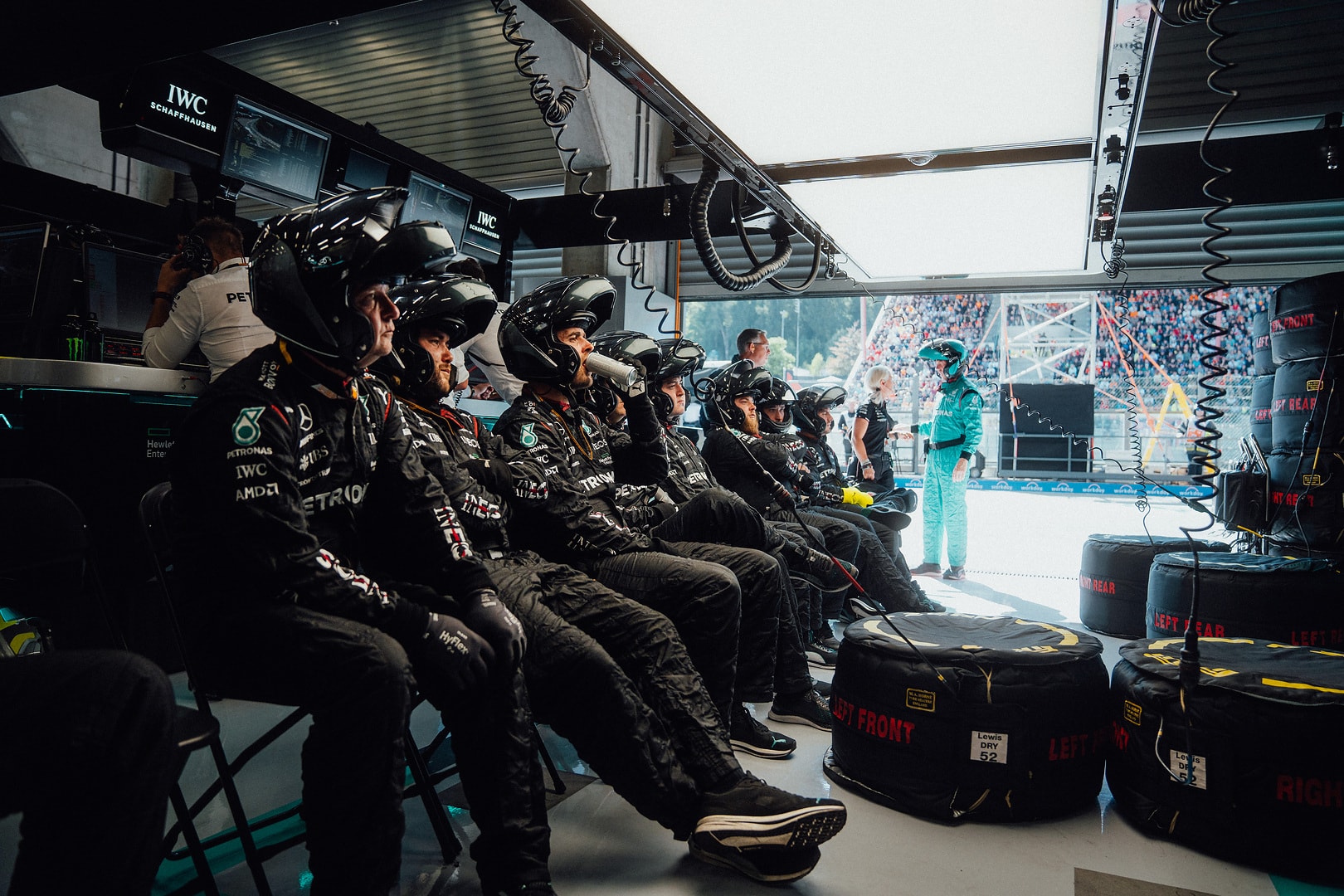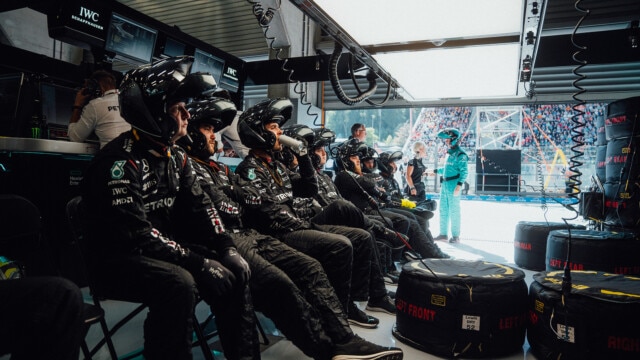How Much Do F1 Engineers Earn?


How much do F1 engineers earn? The salaries in Formula 1 engineering vary widely depending on experience and role. A graduate engineer can expect to earn between £25,000 and £30,000 per year, while a junior engineer’s salary ranges from £45,000 to £65,000 annually. As engineers gain more experience, their earnings increase significantly, with senior engineers making between £70,000 and £115,000 a year. At the top of the hierarchy, chief engineers can command salaries exceeding £175,000 annually.
How Much Do Formula 1 Engineers Earn?
According to Klaas, co-owner of The Casino Wizard, F1 engineers can get paid between £25,000 and £175,000 per year as the pay can vary depending on experience, seniority and the team they are based in. Engineers are a crucial point in Formula 1, them being such an important part of Formula 1 could even increase their salaries to £200,000. Many consider working as an F1 engineer to be a dream job due to the excitement and prestige associated with the role.
However, graduate engineers with master’s degrees can start on graduate schemes which can typically pay between £25-30,000. After a few years, this is likely to increase. Engineering graduates in the F1 industry often have better career prospects and higher starting salaries compared to other engineering sectors.
In Formula 1 teamwork is extremely important. Making the fastest car on the grid will give the driver a much better chance at winning races and championships. This means the reality is that even the best of all drivers can’t win in a slow car.
Formula 1 teams will obviously be looking to employ the best engineers on the planet. If an engineer is the best in their field, they will be paid incredibly well.
This is a major encouragement for younger people looking to get into engineering. However, there are specific factors to keep in mind when it comes to salaries.
Junior/younger engineers will obviously be paid less because they have less experience than senior engineers in Formula 1 and engineering itself.
The chief engineers will be paid the most out of all of the engineers employed, although they are often the ones under the most pressure from team principals, the drivers and even the public when it comes to the performance of the car.
F1 Engineer Salary By Role
The typical salary different engineers can expect are as follows:
Graduate engineer: £25,000-£30,000 a year
Junior engineer: £45,000-£65,000 a year
Senior engineer: £70,000-£115,000 a year
Chief engineer: £175,000+ a year
F1 engineers are crucial to all teams which is why they get paid such a great salary. Software engineers, who specialize in developing and maintaining the software systems used in F1 cars, also play a vital role and can expect competitive salaries based on their experience and qualifications.
How much an engineer in Formula 1 gets paid will also depend on the team they are working for. With high-end teams such as Mercedes, Ferrari and Red Bull, engineers are more likely to get paid a lot more than an engineer working in a lower-end team like Williams or Haas.
This is mainly because the bigger teams are able to pay more which helps them get better engineers. Teams will also receive prize money from the FIA which could give them the opportunity to spend it on even better engineers for their team.
All teams earn some money at the end of the year from the FIA, but teams can choose how to spend it. Sometimes it will be spent on engineers and other times completely different things.
Formula 1 engineers can also be paid bonuses depending on how well the team do. If the team they work for wins the Constructors Championship, they’ll often be given a bonus. This encourages engineers to work much harder than they already do and make sure the car performs up to the standards it’s given. Although, if a team hasn’t performed as well as the previous years then it’s highly likely engineers won’t be given a bonus.
Bonuses can also be given if a race is won for the team, get a pole position in qualifying, or if they’re team sets the fastest lap in a race.
F1 engineers have one of the hardest jobs, making sure the car is suitable to drive and win races. They are under a lot of pressure all of the time. If there are complaints about the car or if it doesn’t perform up to standards, that will fall back on them. They are responsible for the performance, whether that be good or bad.
Formula 1 engineers will be expected to make informed decisions and analyse data about the setup required to generate the best of the cars on the grid.
How much is an F1 pit crew salary?
The highest-paid person in Formula 1 pit crew staff is the crew chief. They are the one who holds the most important duties regarding a pit stop. The bigger teams in Formula 1 like Mercedes or Red Bull pay expensive salaries to their pit crew staff, for example, the crew chief has a pay of £10,000 per race.
The tyre changers also hold a lot of responsibility, making sure new and fresh tyres are put on in record timing so the driver’s race doesn’t get affected. The maximum a tyre changer earns per race is £5,000.
There are also other members of a pit crew team but they don’t hold as much responsibility as the ones mentioned already.
Along with the crew chief and tyre changers you also have the tyre carriers, jackmen, wingmen, stabiliser and the fire extinguisher man.
Tyre carriers earn £3,500 per race while Jackmen and Wingmen get paid the same amount which is £3,000 per race. A stabiliser makes £2,500 per race.
The lowest pay a member of pit crew staff earns is £500 per race. That member of staff is the fire extinguisher. They earn such a low amount due to there not being many fires in the pit lane, they are there mainly for safety measures.
The pit crew of a Formula 1 team also play a crucial role during a Grand Prix weekend and can determine their driver’s final race result.
The Red Bull team was once the king of pit stops, however, the crown was taken by the McLaren team at the 2023 Qatar Grand Prix when they completed a pit stop in just 1.80 seconds, shaving 0.02 of a second off the previous best time set by Red Bull.
NEW WORLD RECORD HOLDERS! 🏅
1.80s, the fastest ever Formula 1 pit-stop!#QatarGP 🇶🇦 pic.twitter.com/pMlAallD9s— McLaren (@McLarenF1) October 9, 2023
Fastest Ever F1 Pit Stop
How much do Ferrari F1 engineers make?
Salaries for engineers in Ferrari range from £45,000 to £350,000. Their salaries start at £44,802 per year and can go up to £326,494 per year for the highest level of seniority.
A Ferrari engineer is roughly paid the same as any of the engineers in a top team. If you look at how much a Mercedes, Red Bull or McLaren engineer is paid it will be roughly the same pay range.
This would obviously vary for an engineer in a lower-down team like Haas and Williams, they aren’t able to pay so much towards their engineers as they have other things to pay for.
While teams like Ferrari have enough of a budget they don’t have to worry about how much they pay their engineers, if they want the best car possible they are going to have to pay a lot of money for them.
As mentioned previously engineers can also get bonuses which would increase their salary, but that does determine how well their team does.
How much do Red Bull Formula 1 race engineers get paid?
Red Bull, a top-tier Formula One team, pays its Staff Engineers an average annual salary of $105,821, which consists of an estimated base salary of $95,382 and a $10,439 bonus. Compared to the US average for a Staff Engineer, Red Bull’s compensation is slightly lower by $1,300. It’s worth noting that Staff Engineer salaries at Red Bull can vary widely, ranging from $53,443 to $172,500 depending on factors such as experience, skills, and location. In addition to their salaries, Red Bull Staff Engineers also benefit from a range of perks and benefits, including health insurance, retirement plans, and paid time off.
How much do McLaren F1 senior engineers make?
McLaren Group Engineers earn an average salary of £45,000 per year, with salaries ranging from £30,000 to £67,735 per year. This estimate is based on 43 salary reports from current and former McLaren Group employees, and may include bonuses and other forms of compensation. It’s worth noting that salaries for Engineers may vary based on factors such as location, experience, and job responsibilities.
How much do F1 aerodynamicist make?
The salary of an F1 aerodynamicist can vary depending on their level of experience and the team they work for. However, according to various sources, the average salary for an F1 aerodynamicist is around £40,000 to £60,000 per year.
Junior aerodynamicists with less experience may earn around £30,000 to £40,000 per year, while senior aerodynamicists with more experience and expertise can earn upwards of £100,000 per year. The salaries of top aerodynamicists can be even higher, with some reports suggesting that they can earn up to £300,000 per year or more.
It’s worth noting that salaries can vary depending on factors such as the size and success of the team, the location of the team, and the demand for skilled aerodynamicists in the industry. Additionally, F1 teams may offer other benefits such as bonuses, performance incentives, and opportunities for career advancement, which can also impact the overall compensation package for an aerodynamicist.
Watch: 13 questions you’ve ALWAYS wanted to ask an F1 pit crew!
Red Bull Senior Power Unit Assembly Technician Calum Nicholas answers thirteen questions about what it’s like to work on an F1 Pit crew.
How to become an F1 graduate engineer
Interested in any of the above? Well, let’s find out what you need to do to get a job in F1.
First of all, you’d typically need to showcase exceptional grades at an advanced level in school in STEM subjects like Maths, IT, Design, Physics and Chemistry. It is essential to get good grades in all of these subjects.
Once you’ve finished Comprehensive school/ High school a student looking to go into engineering should look at completing their engineering studies through a College/ University or an engineering apprenticeship. However, it would be hard to find an apprenticeship in engineering without any experience in engineering.
Engineering graduates working in the Formula 1 industry can expect varying pay levels based on positions and experience, often earning competitive salaries compared to other engineering sectors.
You’ll need a degree or equivalent in mechanical or automotive engineering. Most universities in the UK offer mechanical engineering courses and this should enable you to learn and study vehicle dynamics or mathematical modelling, which is essential knowledge within your role.
It would also be a good idea to enhance employment opportunities after graduation. You could do this by trying to find jobs in a motorsport-related work placement as part of your degree.
Due to the competitive nature of the Formula 1 industry, you’d usually be expected to couple your engineering degree with a specialised master’s degree in fields such as aeronautics, mechatronics, programming, or design.
As well as completing the qualifications needed, experience is also essential. Possible areas to get experience could include joining a Formula student team, acquiring a shadowing job or providing services at racing events free of charge (volunteering). Getting experience doesn’t always have to be Formula 1 related, as long as it’s within the motorsport industry.
Although you don’t have to get your experience through Formula 1, it is advisable to be involved with racing that follows Formula 1 rules set out by the FIA as it typically acts as a training ground for individuals looking at getting involved with Formula 1.
These alternatives could be Formula karting, Formula E, Formula 3 or Formula 2. For women looking to get involved the W Series is a great option.
You could also volunteer for race teams for free in your spare time, this gives you experience in the motorsport environment.
Marshalling can also be a good option as it gives paddock access making it possible to experience the Formula 1 life and what it’s like close-up, it can also help you decide whether that’s what you really want to peruse.
However, it isn’t always possible to walk into a race engineering job straight away, especially as an F1 engineer.
Most race engineers have worked their way up to the position they want or where they are, usually after having worked as a vehicle dynamicist and a data engineer. It may not always be Formula 1 engineers working their way up though, most F1 engineers actually work their way up through rallying, NASCAR or similar forms of motorsport.
Alternatively, you could work in junior race teams as a data analyst and develop ‘on the ground’ the skills that are needed to graduate to a race engineer. Software engineers within F1 teams also play crucial roles, requiring specialized education and practical experience to handle the demanding nature of the job.
You’ll need quite a few skills if you want to work in a Formula 1 team though, skills like:
-Resilience
-Quick thinking
-Outstanding communication skills
-The ability to work well in a team
-Problem-solving
There are a few more skills that you’d need but these are the main ones to focus on for now.
You may ask why would I want to become an F1 engineer? Along with the large amount of hard work, there are also a few perks that come along with a good salary.
Perks include, but are not limited to the following:
-Travel and accommodation costs to each venue of a calendar year
-Medical insurance
-Pension schemes
-Merchandise/ticket price discounts
-Team performance bonuses(such as race wins, fastest lap, championship wins, etc)
-Shared opportunities
As you probably already know, F1 engineers have to travel the world to be able to attend races for their team. Since the engineers are working, as mentioned before, their travel and accommodation costs will be covered by the team. This means that F1 engineers get to travel the world for free!
As they are team members, F1 engineers might receive discounts on ticket prices, which will allow their friends and family to attend the races at much lower costs. They could also potentially be given discounts on team merchandise, which is really expensive in Formula 1.
Formula 1 crew members also get medical insurance and pension schemes from their employers. However, this does depend on the team.
Formula 1 teams can be made up of 1000+ people, but they are all very well looked after as they are the best at what they do and the teams want to treat them well for all their hard work.
In conclusion, if you want to be an engineer or would like to go down that path, an F1 engineer is the way to go. There are many benefits and it is an incredibly enjoyable job to have when you’re not under pressure during a race weekend.
The Current Landscape of Gender Diversity in F1 Engineering
While women have made remarkable strides in F1, they remain underrepresented, especially in engineering and other technical roles. Notable professionals like Ruth Buscombe have broken through barriers, yet the gender disparity is still evident. An ESPN survey revealed that while 38% of Formula One Management’s employees are female, the percentage drops significantly within the teams. For instance, Mercedes, one of the larger teams, has 117 women out of approximately 1000 employees, with only four women in their core race team of 65 people.
The Significance of Promoting Gender Diversity
- Innovative Problem Solving: Diversity brings a variety of perspectives and approaches to problem-solving. Women in F1, such as Dr. Kathryn Richards, a wind tunnel technician at Mercedes, and Ruth Buscombe, have showcased their expertise and contributed to the sport’s technical advancements. Their presence not only enriches the problem-solving pool but also brings innovative solutions to the table.
- Inspiring Future Generations: Visibility of women in significant roles within F1, whether in engineering, management, or on-track activities, serves as inspiration and tangible proof to young girls and women that a career in motorsport engineering is attainable and rewarding. Role models like Chloe Targett-Adams and Ruth Buscombe illustrate that women can navigate and succeed in F1.
- Enhancing Team Dynamics: Gender diversity can enhance team dynamics by introducing varied perspectives and approaches to challenges and strategies. Women in F1 have demonstrated their capabilities in various roles, from engineering to management, contributing to the sport’s evolution and success.
Strategies to Promote Gender Diversity in F1 Engineering
- Educational Initiatives:
- Engage in partnerships with educational institutions to promote STEM subjects among girls.
- Implement scholarship programs specifically aimed at encouraging women to pursue engineering and other technical careers in motorsport.
- Visibility and Representation:
- Highlight and celebrate the achievements of women in F1 through various platforms to enhance their visibility and serve as inspiration.
- Engage women in F1 in outreach programs, talks, and workshops to directly inspire and guide aspiring female engineers.
- Inclusive Recruitment and Career Development:
- Adopt recruitment strategies that encourage applications from women and ensure that hiring processes are unbiased and inclusive.
- Implement mentorship and career development programs within F1 teams that are specifically designed to support and advance the careers of women in the industry.
- Creating a Supportive Work Environment:
- Establish policies and practices that ensure a supportive, respectful, and inclusive work environment for all team members.
- Implement programs that address and mitigate challenges and biases that women might face in their careers within F1.
Promoting gender diversity in F1 engineering is not merely a matter of equity but is pivotal for enhancing innovative problem-solving, inspiring future generations, and enriching the sport as a whole. By adopting strategies that encourage and support women in pursuing and advancing careers in F1, the industry can move towards a more diverse and inclusive future.
The Demands of F1 on Team Performance
F1 is not just physically demanding for the drivers but also for the engineering and pit crew who work behind the scenes. The pit crew, for instance, needs to perform with precision under immense pressure, ensuring that pit stops are executed flawlessly and within a matter of seconds. Engineers, on the other hand, are tasked with ensuring that the vehicle performs optimally, managing a myriad of variables and making real-time decisions that could influence the race outcome. The physical and mental stress experienced by these individuals is palpable and necessitates a focus on maintaining a healthy work-life balance and managing stress effectively.
Ensuring Mental and Physical Well-being
- Physical Health:
- Implementing regular health check-ups and fitness programs to ensure that team members are physically capable of handling the demands of their roles.
- Providing necessary gear and equipment to safeguard them against potential physical risks and injuries.
- Mental Health:
- Establishing mental health programs and providing access to professional psychological support to help team members navigate the pressures of the sport.
- Implementing mindfulness and stress-management workshops to equip team members with strategies to manage stress effectively.
- Rest and Recovery:
- Ensuring that team members have adequate time for rest and recovery, especially after intense races or during the off-season.
- Implementing policies that encourage taking breaks and utilizing vacation time to rejuvenate and recover.
Work-Life Balance Strategies
- Flexible Work Arrangements:
- Exploring flexible work arrangements during the off-season or non-race periods to allow team members to spend time with family and engage in personal activities.
- Implementing policies that ensure reasonable working hours and provide compensatory time-off following intense periods of work, such as race weekends.
- Team Building and Support Systems:
- Engaging in team-building activities that foster a supportive and collaborative work environment.
- Establishing peer-support systems within the team to provide an avenue for sharing experiences and coping strategies.
- Career Development and Growth:
- Providing opportunities for career development and growth within the team, ensuring that individuals feel valued and invested in.
- Implementing recognition and reward systems to acknowledge the hard work and dedication of team members.
The high-stress environment of F1 necessitates a robust approach to ensuring the mental and physical well-being of all team members, from the drivers to the engineers and pit crew. By implementing strategies that focus on health, work-life balance, and supportive work environments, F1 teams can safeguard their members against burnout and enhance overall team performance and cohesion.
The Financial Landscape in F1 Teams
Salary disparities among F1 teams, particularly between top-tier teams like Ferrari and Red Bull and lower-end teams like Williams or Haas, can have a significant impact on various aspects of the sport. Top-tier teams, with larger budgets, have the financial capability to attract and retain top talent, both in terms of drivers and engineering teams, which can influence the competitive balance in F1.
Impact on Competitive Balance
- Attracting and Retaining Talent:
- Teams with larger budgets and higher salaries for engineers and drivers are often in a better position to attract and retain top talent in the industry.
- The availability of financial resources allows these teams to invest in research and development, further enhancing their competitive edge.
- Technological Advancements:
- Financial capabilities enable teams to invest in technological advancements, contributing to better on-track performance.
- Teams with limited budgets may struggle to keep up with the technological advancements and innovations introduced by wealthier teams.
- Team Performance and Success:
- The ability to hire experienced and skilled professionals, coupled with investments in technology, often translates to better team performance and success on the track.
- Lower-end teams might find it challenging to compete with top-tier teams, both in terms of technological advancements and on-track performance.
Influence on Career Choices of Engineers
- Career Trajectory and Development:
- Engineers and other professionals might be drawn to teams that offer better financial incentives and career development opportunities.
- The reputation of top-tier teams and the potential for career advancement can also be attractive to individuals in the industry.
- Job Security and Stability:
- Larger teams with substantial financial backing might offer better job security and stability, which can be appealing to professionals in the industry.
- Smaller teams, particularly those struggling with financial constraints, might be perceived as offering less job security and stability.
- Working on Cutting-Edge Technology:
- Engineers might be attracted to teams that are at the forefront of technological advancements in F1, offering opportunities to work on cutting-edge technology and innovations.
- The opportunity to contribute to a team’s success and to be involved in developing technologies that can potentially change the sport can be a significant draw.
Actionable Strategies to Mitigate Disparities
- Developing Talent Internally:
- Teams, particularly those with limited budgets, might focus on developing talent internally, investing in training and development programs to enhance the skills of their existing staff.
- Establishing partnerships with educational institutions and implementing internship and graduate programs can also help in nurturing talent from the ground up.
- Collaborative Research and Development:
- Exploring opportunities for collaborative research and development, where teams can pool resources and knowledge, might help in mitigating disparities.
- Establishing a consortium or a collaborative platform where teams can work together on certain aspects of research and development can also be explored.
Salary disparities among F1 teams can significantly impact the competitive balance in the sport and influence the career choices of engineers and other professionals. Implementing strategies that mitigate these disparities and ensure a level playing field is crucial for the sustainability and future of the sport.
F1 Race Engineer Salary FAQs
What is an F1 engineer?
An F1 engineer is a specialized professional who designs, develops, and maintains the complex systems and components of an F1 car. These can include everything from the engine and transmission to the aerodynamics and electronics. F1 engineers typically have a background in mechanical or electrical engineering, and they work closely with the team’s drivers, mechanics, and other support staff to optimize the car’s performance.
How much do F1 engineers earn?
The salaries of F1 engineers can vary widely depending on their experience and level of expertise. Junior engineers may earn around $50,000 per year, while senior engineers can earn well over $100,000 per year. In some cases, top-level engineers may earn even more than this. It’s important to note that F1 engineers often work long hours and are required to travel extensively, which can be reflected in their salaries.
What is an F1 pit crew?
An F1 pit crew is a specialized team of mechanics and support staff who are responsible for servicing and maintaining an F1 car during pit stops. This can include everything from changing tires and refueling the car to making quick repairs or adjustments to the car’s systems. Pit crews work under high-pressure, time-sensitive conditions, and must be able to perform their tasks quickly and accurately to keep the car in the race.
How much do F1 pit crew members earn?
As with F1 engineers, the salaries of pit crew members can vary depending on their specific roles and levels of experience. Pit crew members can earn anywhere from $50,000 to $150,000 per year, with some highly experienced and specialized crew members earning even more. It’s important to note that pit crew members often work long hours and are required to travel extensively, often to different countries for races.
How do F1 engineers and pit crew members work together?
F1 engineers and pit crew members work closely together to optimize the performance of the car during races. Engineers may use data and telemetry to monitor the car’s systems and make adjustments or give advice to the driver during the race. Pit crew members may also communicate with the driver during pit stops to coordinate repairs or adjustments. Overall, the success of an F1 team relies on the collaborative efforts of all its members, from the engineers to the mechanics to the drivers.
How do F1 salaries compare to other motorsports?
F1 is one of the highest-paying motorsports in the world, with top-level drivers and support staff earning millions of dollars per year. However, salaries can vary widely depending on the specific role and level of experience. In general, F1 salaries are higher than those in other motorsports such as NASCAR or IndyCar.
Is F1 a high paying job?
Yes, F1 is a high-paying job, both for drivers and other members of the teams. According to reports, top F1 drivers can earn tens of millions of dollars per year in salary, bonuses, and endorsements. The exact amount varies depending on the driver’s performance, popularity, and contract negotiations, but some of the highest-paid drivers in recent years have reportedly earned more than $40 million per year.
In addition to the drivers, other members of F1 teams, such as engineers, mechanics, and team managers, can also earn significant salaries. These roles require specialized skills and expertise, and the demands of the sport mean that team members may work long hours and travel extensively throughout the year.
Overall, F1 is one of the highest-paying sports in the world, and its top performers can earn significant rewards for their talent and hard work. However, it’s worth noting that the high salaries are typically reserved for a small number of top performers, and many people who work in the sport may earn more modest salaries.
Is being an F1 engineer stressful?
Being an F1 engineer can be a highly stressful job due to the intense pressure and demands of the sport. F1 teams operate in a highly competitive environment, where even small performance gains can make a significant difference in the race results. As a result, engineers are under constant pressure to develop and improve their team’s cars, often working long hours and under tight deadlines.
In addition to the technical demands of the job, F1 engineers must also work closely with other members of the team, including drivers, mechanics, and team managers. This requires strong communication and interpersonal skills, as well as the ability to work effectively under pressure.
The stress of the job can also be compounded by the travel demands of the sport, as F1 teams compete in races all over the world throughout the year. This can mean long periods away from home and family, as well as the challenges of adapting to different time zones and cultures.
Despite the challenges, many F1 engineers find the job rewarding and fulfilling, with the opportunity to work at the cutting edge of automotive technology and be part of a highly skilled and dedicated team. However, it’s worth noting that the high stress levels of the job can also take a toll on mental and physical health, and many teams take steps to support their employees’ well-being through programs such as stress management training and employee assistance programs.
How many hours a week do F1 engineers work?
The number of hours that F1 engineers work can vary depending on their role and the demands of the job. However, it’s common for F1 engineers to work long hours, often exceeding the typical 40-hour workweek.
According to some reports, F1 engineers can work up to 80 hours per week during the racing season, which typically runs from March to December. This can include long days at the track during race weekends, as well as extensive travel and preparation time.
Outside of the racing season, F1 engineers may still work long hours as they prepare for the next season, developing new technologies and refining their team’s cars. This can involve working on simulations, data analysis, and other technical tasks, often under tight deadlines.
It’s worth noting that while long hours are common in F1 engineering, many teams also prioritize work-life balance and employee well-being. This can include offering flexible work arrangements, providing mental health support, and encouraging employees to take time off to recharge.
Do F1 engineers go to races?
Yes, F1 engineers typically attend races as part of their job. Engineers play a crucial role in the success of an F1 team, and their knowledge and expertise are essential to the performance of the cars on the track.
During race weekends, F1 engineers work closely with the drivers and other members of the team to monitor the performance of the cars, analyze data, and make adjustments to the setup as needed. This requires a deep understanding of the technical aspects of the cars, as well as strong communication and problem-solving skills.
In addition to their work at the track, F1 engineers also play a key role in the development of the team’s cars and technologies throughout the year. This can involve working on simulations, data analysis, and other technical tasks, often in collaboration with other engineers and experts.
Overall, attending races is an important part of an F1 engineer’s job, and it provides a unique opportunity to see the cars in action and work closely with the rest of the team to achieve success on the track.
Are there any female F1 engineers?
Yes, there are female F1 engineers, although they remain a minority in the sport. Historically, F1 has been a male-dominated field, but in recent years, there has been a growing recognition of the need for greater diversity and inclusion in the sport.
One notable female F1 engineer is Ruth Buscombe, who worked as a strategy engineer for the Williams F1 team, and Dalia Ramos who is the Head of Build and Test for the BWT Alpine F1 team. Other female engineers have worked in various roles across the sport, including aerodynamics, vehicle dynamics, and data analysis.
While the number of female F1 engineers remains relatively small, there are initiatives underway to encourage more women to pursue careers in engineering and motorsport. For example, the FIA’s Women in Motorsport Commission promotes gender diversity in all areas of motorsport, and many teams have launched their own programs to support and mentor young women in the field.
Are there any female F1 pit crew?
Yes, there have been female F1 pit crew members in the past, although they remain a minority in the sport. Pit crew members play a crucial role in the success of an F1 team, performing rapid tire changes, fueling, and other essential tasks during pit stops.
In recent years, there have been efforts to increase diversity and inclusion in F1, including a push to recruit more women to work in the sport. Some teams have launched their own initiatives to support female pit crew members, and there have been several high-profile examples of women working in pit crew roles.
For example, in 2021, the Venturi Formula E team made history by fielding a pit crew that was entirely made up of women. Similarly, in 2020, the Richard Mille Racing team made history by fielding an all-female crew for the 24 Hours of Le Mans endurance race.
While the number of female pit crew members in F1 remains relatively small, there are efforts underway to encourage more women to pursue careers in motorsport and to break down barriers to entry in the sport.





